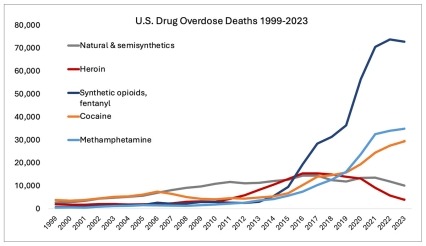The National Institute on Drug Abuse (NIDA) is the lead federal agency supporting scientific research on drug use and addiction. After decades of research, we now understand substance use disorders (SUDs) to be chronic but treatable brain disorders that emerge from the complex interplay of biological, social, and developmental factors. Adverse social and environmental elements enable biological vulnerabilities to SUDs to emerge, just as protective factors in one’s social environment reduce the risk of substance use and addiction. NIDA-supported research has illuminated these risk and protective factors and led to the development of effective prevention and treatment interventions, providing hope for the more than 40 million people in the United States with SUDs and their loved ones. Yet, NIDA’s mission remains critical, given the challenges that SUDs present to the nation today.
Drug overdoses in the United States started to rise beginning in the late 1990s, driven by the overprescription of opioids for pain that resulted in diversion and a rise in opioid addiction and overdoses. This subsequently expanded to overdoses from heroin and fentanyl, worsening the overdose crisis. More recently, the co-use of stimulants has compounded the problem. Still, recent data offer hope. The escalation of drug overdose deaths began to decelerate in 2021, and data from the Centers for Disease Control and Prevention showed a significant decrease in deaths in 2023, with provisional data suggesting this continued in 2024. It is critical that scientific solutions continue to be developed and deployed to address an evolving addiction and overdose crisis characterized by shifting use of different substances and the concomitant use of multiple drugs and drug classes.
In the face of an ongoing addiction and overdose crisis, NIDA’s FY 2022-2026 Strategic Plan represents an opportunity to take stock of how far we have come in drug addiction research while also redoubling our focus on the priorities and values that will move our mission forward. The strategic plan reflects our commitment to advancing all aspects of addiction science in the service of improving people’s lives. Today’s landscape of substance use poses both unique challenges and unprecedented opportunities to leverage the amazing potential of science toward that goal. While we have made impressive progress, there is more to be done.
I profoundly thank all those who contributed their thoughts and expertise to this strategic plan. I look forward to continuing to work together to achieve NIDA’s ambitious goals.
Nora D. Volkow, M.D.
Director, National Institute on Drug Abuse

